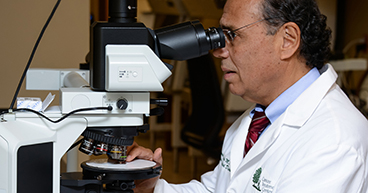


194 Posts

April 26, 2018
Another concern for obese patients: Fat cells may hinder chemotherapy’s impactObese cancer patients often don’t respond as well to chemotherapy as patients who are not overweight. One study may explain why.

April 19, 2018
Cardio-oncology: Emerging field focuses attention on preventing heart damageIt’s a common conundrum faced by cancer doctors: Many of the treatments they use to fight cancer may do their job well, but at the same time, they may cause serious damage to the heart.

April 17, 2018
How to read a pathology report“If you don’t have a correct diagnosis, you cannot treat the patient correctly,” says CTCA Pathologist Fernando U. Garcia, MD. Learn about the critical role a pathology report plays in the cancer patient’s journey.

April 10, 2018
Focused radiation may help turn on the immune systemResearchers are finding that combining immunotherapy with focused radiation treatments delivered directly to the tumor sometimes shrinks not just the targeted tumor, but cancers located in areas of the body that were not radiated.

April 5, 2018
Metastatic breast cancer drugs may help patients delay chemotherapySome patients may put off chemotherapy treatments for more than two years, thanks to a new class of drugs approved for metastatic breast cancer.

March 15, 2018
Why does malnutrition affect GI cancer patients more than others?In patients with cancer of the gastrointestinal system, malnutrition is a constant threat because of the digestive tract's role in processing food and waste. Still, patients can take certain precautions in keeping their body nourished, and getting educated about the issue is a good first step.

March 8, 2018
Exceptional responders: Why do some cancer drugs work for them and not others?Some cancer patients respond so well to certain treatment when others do not that scientists are researching what makes them unique. Find out what they're learning about so-called exceptional responders, and how that may lead to advancements in cancer treatment.

March 6, 2018
Traveling cancer patients get extra assistance during screenings: Know your optionsRecognizing how difficult traveling can be for cancer patients, the federal government has developed a program to reduce the stress during airport security screenings.

March 1, 2018
Protecting yourself during cancer treatmentExperts recommend that patients protect themselves from infection by taking certain precautions, many of which may make for some socially awkward moments, like declining a handshake at a business meeting. But there are ways to manage both your health and your social relationships, and it often starts with a healthy dose of information.
Guidelines
The information contained in this blog is not intended nor implied to be a substitute for professional medical advice. Always seek the advice of your physician or other qualified health provider prior to starting any new treatment or with any questions you may have regarding a medical condition. Nothing contained in the blog is intended to be used for medical diagnosis or treatment of any illness, condition or disease.